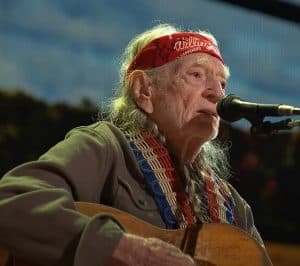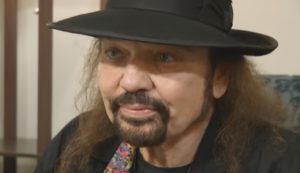The 3 Classic Rock Legends With The Greatest Vocal Ranges And How They Redefined Music

Youtube @ratsrevus
What defines a genuinely legendary rock vocalist? Undoubtedly, stage presence and the ability to whip even the largest crowds into a frenzy are crucial elements, but the finest rock singers possess qualities that extend beyond these.
When a rock band’s frontman possesses a combination of range, power, articulation, and technical mastery, they’re off to a strong start. However, true iconic status necessitates the ability to shatter boundaries, evoke deep emotions, and exude an ineffable charisma that places them in a league of their own.
If we’re talking about the greatest range, then there are singers out there who can reach beyond what Freddie Mercury or Robert Plant can ever do. American vocalist Tim Storms achieved the record for widest range with a whopping 10 octaves. That’s astounding! Storms can also do the lowest vocal note ever recorded.
But this distinction is the reason why anyone ever heard of Storms. He is his own legend, of course, but some classic rock legends forged their own tales of rock and roll out of sheer will and commitment.
Some of these attributes can be learned or honed through study, but an iconic vocalist is an inherently unique individual who cannot be manufactured. Regardless of their level of expertise, their desire to communicate their story and rock spirit transcends all else.
3. Steven Tyler of Aerosmith
Steven Tyler of Aerosmith consistently secures a prominent spot on all lists dedicated to the greatest singers in music history. Whether it’s his soaring rendition of a high E6 in the track ‘Crazy’ or his commanding delivery of a D2 note in ‘St. John,’ Tyler has earned the moniker ‘Demon of Screaming’ due to his exceptional command of high-pitched notes.
His vocal range spans an impressive spectrum, from the low D2 to the lofty E6, and his vocal style is often characterized as that of a countertenor. The song below, “Dream On”, was their first hit and it still gives people chills even though Tyler masked his voice with an obviously subdued style during their earlier years.
“Dream On” continues to enjoy immense popularity, thanks not only to Tyler’s soulful vocals but also to the incredible vocal range he demonstrates throughout the song. Many believe that his vocal abilities occasionally surpass those of classically trained operatic singers.
This might explain why Tyler tends to experience apprehension whenever another band contemplates covering an Aerosmith song, be it ‘Crying’ or ‘Living on the Edge.’
Tyler was once featured on National Geographic’s “Incredible Human Machine” to measure the resilience of the human voice after many years of strain. Real-time monitoring done during the show displayed the frontman’s strain during his vocal performances, with decibel levels exceeding 110 in loudness.
STEVEN’S BEL CANTO
What’s more amazing was how the ‘Demon of Screaming’ preserved his magical voice despite all the years of top rockstar performance and significant substance abuse. It appears there’s a well-founded explanation for this: the Aerosmith frontman was known to employ a method that traces its origins to Italian opera singers, known as bel canto.
Bel canto instructs on the art of correct breathing to minimize strain on the vocal cords. Remarkably, this technique has the effect of fortifying one’s voice with age, thus accounting for the enduring resilience of his vocal cords.
View this post on Instagram
AN UNPARALLELED VOCAL ACROBAT
As one revisits Aerosmith’s classics one can’t help but be reminded why Steven Tyler is a timeless icon. His soulful, raspy vocals are a force of nature, and they’ve kept fans like me captivated for decades.
It’s not just about the impressive vocal range; it’s about the storytelling, the energy, and the sheer charisma that he brings to every performance. There’s something magical about the way he can take you on an emotional journey with his voice, making you feel every high and low of the music.
Whether it’s “Crying” or “Living on the Edge”, when he sings, it’s like a piece of rock ‘n’ roll history coming alive, and you just can’t help but be in awe of the greatness that is Steven Tyler.
Tyler’s reverence for both the excellence of his voice and his on-stage performance is a major factor contributing to his incredible artistry as a well-known rock vocalist. This commitment to preserving his unique sound and consistently delivering uncompromised performances is what makes him a legend.
2. Axl Rose of Guns N’ Roses
This might come as a surprise, but did you know that Axl Rose was actually the greatest singer of all time? At least that’s what this chart says.
Notwithstanding what the interactive chart declared, the lead singer of Guns N’ Roses has earned a well-deserved spot on numerous lists ranking the greatest vocalists in the music industry, with notable mentions in publications like NME and Rolling Stone Magazine.
Axl Rose made a significant impact on both critics and audiences with Guns N’ Roses’ debut album Appetite For Destruction in 1987. Iconic tracks such as “Sweet Child o’ Mine”, “Paradise City”, and “Welcome To The Jungle” are widely regarded as some of the most challenging songs for vocalists to cover.
The legendary frontman’s vocal range is nothing short of impressive, spanning from the deep F1 in the song “There Was A Time” from the album Chinese Democracy to the soaring B♭6 note, which can be heard in “Ain’t It Fun” from The Spaghetti Incident?.
UNIQUE SINGING TECHNIQUE
In addition to his remarkable vocal range, Axl Rose possesses a distinctive singing technique that sets him apart from his peers. He’s known as a bass-baritone who effortlessly channels the qualities of a tenor, creating the sensation that his songs feature two distinct vocalists within one band.
One of the distinguishing features of Axl’s singing is the grungy timbre, a departure from the typical heavy metal vocalists. His stamina and endurance are awe-inspiring; when he graces the stage, his energy rarely wanes, allowing him to occasionally reach high notes reminiscent of a soprano.
The GnR frontman’s unique vocal techniques encompass the utilization of the pharyngeal voice, famously known as the ‘mask voice.’
Wanna thank All the fans, the band n’ every1 4 their concern n’ well wishes!🙏🏼 In Johannesburg w/plenty of time 2 b ready 4 the show!👍🏼This flu or whatever is a wild ride! Comes in waves. Ur ok till ur not!🤢 pic.twitter.com/gfbLR7YemW
— Axl Rose (@axlrose) November 27, 2018
This voice originates from the back of the throat, utilizing pharyngeal or pharynx resonance to introduce a subtle distortion that imparts a nasal and plaintive quality to the sound. These three descriptors – slight distortion, nasal resonance, and a hint of plaintiveness – aptly capture the essence of Axl Rose’s vocal color.
In contrast to many vocalists who balance chest voice, head voice, and pharynx voice, Axl leans significantly on pharyngeal resonance, particularly when executing falsettos. This ability arises from his uniquely developed muscles around the voice box, solidifying his reputation as one of the most extraordinary vocalists of our time.
ONE OF ROCK’S MOST POWERFUL VOCAL DYNAMO
Axl Rose is amazing in the way that he can reinvent himself vocally. He’s not confined to a single style or genre; instead, he effortlessly transitions between rock, blues, and even a touch of soul. Songs like “Sweet Child o’ Mine” showcase his signature raspy timbre and soaring highs, while “November Rain” unveils a softer, more emotive side of his voice.
His versatility allows him to tell a story with each song, connecting with listeners on a deep, emotional level. It’s this chameleon-like quality that makes him an enduring icon.
This vocal prowess and charismatic stage presence have inspired countless artists and ignited the passions of fans worldwide. Whether you’re headbanging to the anthemic “Welcome To The Jungle” or swaying to the haunting melodies of “Estranged”, Axl’s voice is a testament to the enduring power of rock and roll.
Honorable Mentions
Compiling a list of the best rock singers of all time is one of the hardest things to do. Just narrowing it down to the top 10 is already an incredibly challenging feat. Hence there are still vocalists who deserve to be at least mentioned here:
ROBERT PLANT OF LED ZEPPELIN
As the golden voice of Led Zeppelin, Robert Plant’s bluesy wails and commanding presence elevated rock’s vocal standards. His distinctive timbre and range set a new precedent, heard vividly in tracks like “Whole Lotta Love.”
STEVE PERRY OF JOURNEY
Steve Perry’s tenor soared to extraordinary heights, imbuing Journey’s music with raw emotion. Hits like “Don’t Stop Believin'” and “Open Arms” are testaments to his vocal mastery and ability to connect with listeners on a profound level.
JANIS JOPLIN
Janis Joplin’s gritty, soulful voice was a revelation in the ’60s. Her passionate delivery on songs like “Piece of My Heart” broke gender barriers and expanded the possibilities of rock vocals.
JAMES BROWN
James Brown is a legendary figure in the realm of funk music, solidifying his status as one of the finest vocalists to ever grace a microphone. While some may underestimate James’s vocal capabilities, it’s remarkable to note that he possessed an extensive vocal range, stretching from Eb2 to F#6.
MIKE PATTON OF FAITH NO MORE
This one’s truly one of the most surprising honorable mentions here. Mike Patton deserves his place by virtue of his incredible 6-octave range, one of the widest known ranges for any singer. With this incredible talent, Patton was able to climb the ladder of success.
1. Freddie Mercury of Queen
Of course, this can’t be a complete “best rock singer” list without the presence of the best one out there. Regardless if he’s hitting F2 in “All Dead All Dead” or soaring to the high E6 in “It’s Late”, Freddie Mercury not only stands as one of the most exceptional vocalists in history but also boasts unparalleled frontman qualities.
The Queen frontman’s vocal capabilities, spanning a remarkable four-octave range, defy easy categorization. His style seamlessly melds elements of baritone and tenor, showcasing an extraordinary ability to transition from a deep, resonant baritone to a soaring tenor within mere bars of music. Critics often use the term ‘coloratura’ to describe his intricate and demanding vocal virtuosity.
One of the best and most memorable showcases of Mercury’s genre-defying vocal style is undoubtedly “Bohemian Rhapsody”, a timeless anthem of generations of rock fans. The song serves as an unequivocal testament to the singer’s astounding vocal range and songwriting prowess, solidifying his status as an iconic figure in music history.
MORE THAN JUST THE FOUR EXTRA TEETH
The distinct and varied nature of Mercury’s voice is not a mere coincidence; it can be traced back to a unique aspect of his physicality. Freddie was born with four extra teeth, scientifically termed mesiodens.
These surplus incisors led to overcrowding in the front of his dental structure, causing his front teeth to protrude noticeably, resulting in a pronounced overbite. Although he was often seen concealing his teeth, as he had some self-consciousness about them, Freddie adamantly declined any dental treatment for these extra teeth.
His belief was that the additional space created within his mouth due to the protrusion of his upper jaw contributed significantly to his extraordinary vocal range – not to mention that it contributed to his iconic appearance.
But more than this, what made the frontman so different from the other rockstars who can even boast wider vocals than him was his masterful vocal control.
Anyone who has had the pleasure of listening to a Queen track can readily discern his remarkable ability to seamlessly interweave high, low, and mid-range notes.
This exceptional skill stemmed from Freddie’s capacity to produce vibrato and harmonics at a swifter rate than any other vocalist of his era. Furthermore, he exhibited a remarkable capacity to effortlessly transition between vocal registers.
Although he naturally possessed a baritone voice, he predominantly sang as a tenor and effortlessly navigated into soprano ranges. Remarkably, a study examining Freddie’s vocal range confirmed that he could traverse frequencies ranging from approximately 92.2 Hz to 784 Hz, allowing him to consistently hit notes spanning full three octaves from the resonant depths of F#2 to the stratospheric heights of G5.
A TIMELESS SHOWMAN
But Mercury was more than just an incredible voice; he was a showman like no other. Watching him perform was like witnessing a masterclass in entertainment. He had this magnetic presence that drew you in, making you feel like you were part of the performance.
His boundless energy, his flamboyant outfits, and his charismatic stage presence were all part of the Freddie Mercury experience. He knew how to work a crowd, how to make you sing along, clap your hands, and stomp your feet, all while leaving you in awe of his sheer talent.
The singer’s greatness transcends generations. Decades after his passing, his music continues to touch the hearts of people around the world. His songs are timeless, and they speak to universal emotions and experiences.
View this post on Instagram
Whether you’re going through the highs and lows of life, there’s a Freddie Mercury or Queen song for every moment. That’s the mark of a true legend – someone whose artistry resonates with people from all walks of life, and who will forever be celebrated as the greatest singer to ever grace the stage.
Freddie Mercury wasn’t just a singer; he was a force of nature, and his legacy lives on in the hearts of music lovers everywhere.






















